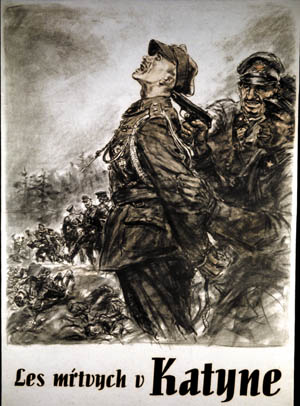The Katyn Forest Massacre
1939. The Partition.
Following the invasion of Poland and the start of World War II, Poland was partitioned between Nazi Germany and the Soviet Union. The Soviet Union claimed it was freeing Ukrainian and Belorussian workers who were supposedly being oppressed by Polish rulers in order to legitimize its invasion of and hold of the rest of Poland.
1940. The Massacre.
On March 5th, 1940, the USSR People’s Commissariat for Internal Affairs (NKVD) put out an order for the massacre of approximately 20,000 Polish military officers, landowners, government officials, and others of similar positions. Each was categorized by their rank or position. Those killed were held in prisoner of war camps of the USSR NKVD and in prisons in the western provinces of Ukraine and Belarus. They were sentenced to the supreme penalty of death by shooting. This order was signed by Stalin, Voroshilov, Molotov, Mikoian, Kalinin and Kaganovich.
1943. The Announcement.
Upon discovering a mass grave in the Katyn Forest near Smolensk, a German radio announced their findings to the rest of the world. They alleged that Soviets had carried out these executions. Thousands of bodies were found in Katyn. More bodies were found in surrounding regions. A medical commission organized by the Germans, composed of international members, excavated the area. This announcement was intended to be propaganda. Since the area was under Soviet control, the goal was for the alliance between the Soviets and the rest of the allies to be disrupted. Diplomatic relations between Poland and the USSR were immediately broken.
1944. The Cover Up.
When the area came back under Soviet control later that year, the Soviet government conducted its own investigation. The report by a special Soviet commission on 24 January 1944 regarding the Katyn Forest Massacre determined that the Polish POWs were captured and executed by Germans. Stalin called the German claims a “monstrous invention by the German-fascist scoundrels” that attempted to disrupt allegiance between allies.
1990. The Reveal.
The Soviet government denied all accusations until under Gorbachev in 1990 it was admitted the executions took place under the order of Stalin and carried out by the NKVD. Official documents were soon turned over to the Polish government providing evidence and admitting blame for the Katyn Massacre.
Examining the Effects.
Researching this topic made me consider how this cover up might have affected the outcome of the war. Had the rest of the world known of the Soviet’s actions, especially soon after the event, would they classify it as a war crime (or genocide, etc.) which would ruin the legitimacy and trust the rest of the world leaders had in the Soviet Union? How was Germany affected by the lies (albeit characteristic of their other actions at the time) fabricated against them? Did the allies know and turn a blind eye, or were the Soviet’s claims convincing?




Alicja, I like how you’ve organized your post according to the chronology of events! I feel like the “chapter” titles you gave each year add to the intensity of the post. You’ve made sense of what could be a convoluted and confusing matter, and addressed the difficulties of dealing with this during war time – great job!
LikeLike
Thank you! It was definitely a very complicated time.
LikeLike
Alicja, this was a very organized post and I enjoyed how you displayed the sequence of events. I think it was amazing the destruction the military force was able to inflict. Why do you believe the German’s globally announced their findings? Especially when in Germany they had been exterminating millions of people as well.
LikeLiked by 1 person
Thanks Austin! If I had to guess I’d say this was a way to ruin the reputation of the Soviets with the U.S. and Great Britain, if successful this would have aided Germany by separating the Soviets from a lot of power. In a way (although it should’ve never happened or at least they should have claimed responsibility earlier) it might be best that they did not believe Germany, or maybe turned a blind eye because it helped with Germany losing the war.
LikeLike
I think Austin is onto something, and you should check out Gina’s post on Katyn, which also asks us to think about how we understand war crimes and how we view them depends so much on which “side” we’re on. Yes, Katyn’ was a war crime committed by the Soviets. Sadly, it almost pales in comparison to German war crimes, which include the Holocaust (6 million dead), The Germans were hardly benevolent occupiers of Poland, and it really wasn’t implausible to think that they could have been behind Katyn’ – which made their eagerness to call the Soviets out even more understandable. The Germans were all about the war in the east and subjugating Slavic people (Poles, Belorussians, Ukrainians, Russians…) was an essential part of the campaign for “Lebensraum.”
LikeLiked by 1 person
Forgot the link to Gina’s post: https://snippetssoviethistory.home.blog/2019/04/06/the-katyn-massacre/
LikeLike
Nice post, Alicja. I find it ironic that the Germans attempted to use a mass grave of Poles as propaganda, while they themselves were engaging in similarly revolting behavior.
LikeLike
Hey Joey! You’re so right! Thank you for the comment.
LikeLike
Hey Alicja!
I thought your post was very organized and easy to follow. I found it shocking that Germany was very quick to call out the Soviets for Katyn even though Germany was exponentially killing more Jews. I honestly have never heard about Katyn before this class (as I’m not too familiar with Soviet history) so I found your post to be very interesting and informative!
LikeLiked by 1 person
Thanks for the read and comment Taylor! It was definitely a very complicated situation politically with many layers.
LikeLike